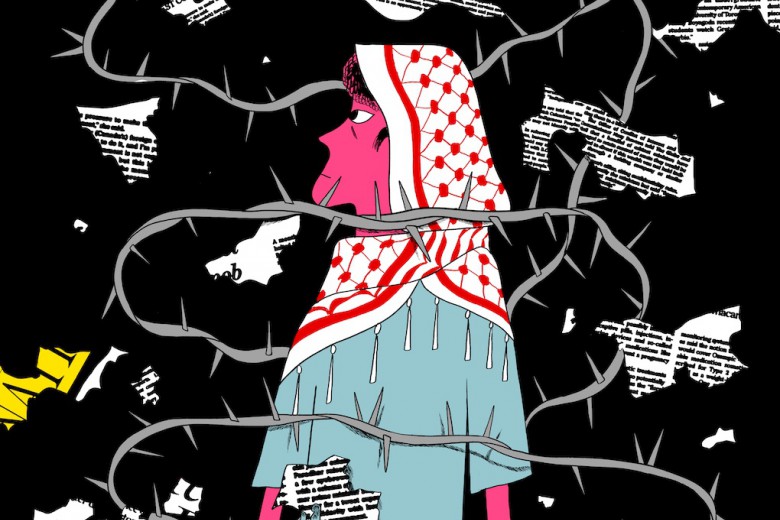This article is a lightly adapted version of a talk the author delivered on July 18, 2019, as part of the Ontario Coalition Against Poverty’s speakers series in Toronto.
IfNotNow Toronto, a group I organize with, is a movement of mostly young Jews working to end the North American Jewish community’s support for Israel’s military rule over Palestinians. This May, we held a teach-in on antisemitism. As the workshop day drew close, we noticed a surprising entry on our list of online sign-ups for the event: the spokesperson of a new group dedicated to “unapologetic Zionism.” This person then announced on Facebook that she was going to mobilize a group of pro-Israel Jews to protest and potentially disrupt our event. So we ended up needing to gather more than a dozen comrades to defend it. We stood outside for hours as our coreligionists – including some far-right Jewish Defence League folks – blared Israeli pop music and screamed at us about the shame that we, as anti-occupation Jews, bring on the Jewish people.
Why would a group of pro-Israel Jews protest an educational event held by another Jewish group? Why is there this struggle over the definition of antisemitism, within the Jewish community and beyond it? Why did we have to defend an antisemitism training from other Jews? (I begin Jewishly by asking questions that breed other questions.)
This puzzle has to do with Israel but isn’t reducible to it. To figure out what’s going on here, we need to ask:
How is antisemitism showing up today?
First of all, there’s been a surge in obvious, explicit forms of it: the Tree of Life synagogue shooting in Pittsburgh, which killed 11 elders in that Jewish community last fall, was the deadliest single antisemitic attack in U.S. history. Jews are the group most targeted by (reported) hate crimes in Canada, and the religious group most targeted in the U.S. The frequency of such crimes has spiked since Trump’s election. From 2016-2017, the number of reported hate crimes against Jews climbed by 63 per cent in Canada and by 37 per cent in the U.S.
Yet, at the same time, many of those who are enabling this surging antisemitism – like those who empower white supremacists – are also making a cottage industry of condemning it: right-wing anti-antisemitism is also on the rise. Trump targets U.S. Congresswoman Ilhan Omar, a staunch left anti-imperialist, and calls her antisemitic even as his presidency emboldens people like David Duke, racist conspiracy theorist and former Grand Wizard of the Ku Klux Klan. The British Labour Party under Jeremy Corbyn is regularly accused of antisemitism by the political centre and right.
Yet, unlike a critical or left account, it asserts that anti-Jewish racism is a problem that can be tackled in isolation from other racisms.
What does this do?
Right-wing condemnation of antisemitism can be a tactic that’s used to suppress left voices, and particularly left criticism of Israel and American imperialism. It can be a form of ad hominem, a way of disqualifying a speaker, placing their words in a category of speech it’s ethically acceptable to censor (so the argument goes).
This right-wing tactic does share a broad definition of antisemitism with left accounts: anti-Jewish oppression. Yet, unlike a critical or left account, it asserts that anti-Jewish racism is a problem that can be tackled in isolation from other racisms. It enters into alliances with institutionalized white supremacy, downplaying the dangers specifically Christian white supremacy poses even to white Jews. And, as we know, it conflates criticism of Israel with bigotry against Jews, claims all anti-Zionism is antisemitism, which erases the many, many Jewish critics of Israel.
So when IfNotNow’s teach-in got crashed by other Jews waving Israeli flags, what we witnessed was a competition over the Jewish community’s working definition of antisemitism – with all the political consequences that flow from it.
One feature of antisemitism that can make it hard to recognize is that, for a long time, it can look and sound a lot like praise.
Now, for someone who wants to deny the basic unity of anti-racist struggles, antisemitism can be useful, since it can often present quite differently from other racisms. If white supremacist race science positions whiteness as inherently superior to – supreme over – other so-called races, grounding its claim to power in the alleged racial inferiority of others, it frequently works the opposite way with Judaism. It says Jews have superpowers. That we control everything, we’re master strategists, shameless marionettists of the economy and the culture. It says we have a unique tendency to transcend the nation, and therefore to reveal the nation’s artificial character, how it’s founded on lies and plunder: origins that the nation feels must be mystified, never exposed. One feature of antisemitism that can make it hard to recognize is that, for a long time, it can look and sound a lot like praise.
It’s praise that turns easily, you might even say inevitably, into murderous contempt. As the New York-based organization Jews For Racial and Economic Justice points out in its pamphlet Understanding Antisemitism, antisemitism is not a fixed hierarchical oppression, but a cyclical one. It moves through cycles of virulence and remission, a deceptive calm. Especially in moments of economic unrest and acute working-class suffering, positive claims of Jewish exceptionalism are liable to dissolve into sneers that Jews are traitors – scheming financiers or communist wreckers of national unity, or both.
As a modern phenomenon, this cycle of antisemitism is embedded in racialized capitalism and its crises of legitimacy. For example, as the theorist Moishe Postone argued, the Nazis may have identified the Jews with the evils of financialized, globalized (“rootless”) capital, but only as part of a project of legitimizing and intensifying another equally capitalist organization of work: industrial production, rooted in national soil. This relationship between capitalist crisis and antisemitic surge means capitalism is structurally unable to provide Jews with durable safety or power. Nor does imperialism have more to offer: white supremacist support for Israel, though multi-faceted, inevitably involves a subtext of that familiar bigot’s jeer: go back where you came from. Even white Jews will never be white enough for nationalists of a white nation.
Antisemitism and whiteness
But let’s linger on this a moment: what is the relationship between antisemitism and whiteness, anyway?
First of all, because it doesn’t get said enough: not all Jews are white. There are many Black Jews, and Sephardic or Mizrahi (North African/Middle Eastern) Jews, vulnerable to harassment by racist police and border officials who may presume them to be Muslim. There’s also a range of experiences of racialization among Jews who generally benefit from whiteness. Whiteness, as we know, is a social and not a biological category, which means its boundaries move. Who gets included in it, at a given time and place, changes. (Anyway, committed antisemites have always been very talented at distinguishing fair-skinned Jewish from fair-skinned Gentile features: consider the article “How to recognize a Jew,” published this year in a Polish newspaper sold inside Poland’s parliament, which cited facial features as one important clue.) White Jews in North America are not “white-passing” – in this specific place and historical moment, we’re white, period – but we may be less or more Christian-passing, and this kind of passing has (for obvious reasons!) a huge effect on whether we become targets for antisemitic hate.
History demonstrates, however, that such Jews are reliably re-racialized, re-othered, in times of crisis for the ruling class.
It’s true that many white Jews, especially those who are more Christian-passing, are tempted (and permitted) to assimilate into the dominant white Christian culture, where they may be granted junior associate positions in the ruling class. History demonstrates, however, that such Jews are reliably re-racialized, re-othered, in times of crisis for the ruling class. A parallel phenomenon, by way of example: the Jewish Defence League has rallied with groups like the Soldiers of Odin (founded by a self-described neo-Nazi), but when there was dissention in the ranks of the local far-right last summer, the guy who leads the JDL in Canada was swiftly on the receiving end of vicious Nazi death threats (content warning: graphic threats of extreme antisemitic violence in the linked article). Some Jews, especially white Jews, may build alliances with oppressors because they think more safety is available there than in solidarity with other oppressed people. Yet we have no clear example of this cynical strategy producing safety for most Jewish people for more than a few generations at best.
But where is all this antisemitism you’re talking about? (we’re asked)
It doesn’t exist, you’re overreacting, it’s not happening to you! (we’re told)
There’s an idea in circulation – a basically antisemitic idea – that only spectacular physical violence is real antisemitism, that every other subjective experience of it is a delusion flowing from a persecution complex. But this misses antisemitism’s basic character, evoked by the definition of antisemitism that IfNotNow used in our teach-in:
“Antisemitism is oppression that targets Jews. Like all oppressions, it involves dehumanization and degradation via lies and stereotypes. These myths change and adapt to different times and places, but wherever they appear, they’re deployed by the ruling class as a strategy for protecting their economic and political power.”
Most of the time, antisemitism operates on the level of the dogwhistle: coded language that affects cultural attitudes and is immediately intelligible to bigots. For example, consider a recent blowout on Twitter. A popular American podcast host used a series of antisemitic tropes in a jokey tweet. He said a “cabal” of “reptilian” “ritual pedophiles” was controlling everything, these words accompanied by a photo of a non-Jewish politician. An accomplished young American Jewish leftist, a woman in New York, replied that she found this language dangerous, wrongheaded, playing into alt-right antisemitic conspiracy theories. The replies to her complaint, mostly from fans of the podcast, were a case study in actually existing antisemitism on the left. She was made fun of, told she was “reaching,” just being paranoid. Her use of the word “trope” more or less got made into a snarky meme. This is what antisemitism on the left can look like. Not like Ilhan Omar or Jeremy Corbyn, but like dozens of ordinary comrades swarming a young Jew to tell her she’s too sensitive, her oppression is all in her head.
Anti-racist solidarity with Jews means acknowledging that today’s antisemitism is both more common and more insidious than that.
The concept of the microaggression, understood critically, is relevant here. Popularized primarily as a tool for naming covert anti-Black racism, sometimes distorted by liberals who use it to suggest oppression is more a matter of individual speech than of systemic policy, this concept describes an act of interpersonal aggression that’s oblique enough to be deniable. Most antisemitism has this character. An ethical orientation towards it is therefore similar to other calls we hear to surface hidden oppressions: believe Jews when we tell you we’re being made vulnerable. Not blindly or uncritically, but trust that Jewish sensitivities to antisemitic bigotry are not always maladaptive or wrong. Too often, the non-Jewish anti-racist response to antisemitism is to a) acknowledge the general fact of it, but b) deny or minimize any particular instance of it that doesn’t rise to the level of an explicit hate crime. Anti-racist solidarity with Jews means acknowledging that today’s antisemitism is both more common and more insidious than that.
Left anti-antisemitism and anti-racist struggle today
So what’s the way forward for Jewish emancipation as a part of universal emancipation, and for the fight against antisemitism today?
We’ve seen that our community often allies itself with the ruling classes, with oppressors. It does so because it believes it will find safety there, and because its historic trauma leads it to resist an understanding of itself as weak, marginalized, or vulnerable. Established Jewish communities in North America are as likely to ally themselves with anti-Black police forces as with brutalized Black communities. This has to change, and there are significant forces within the Jewish community – often young, queer, and anti-capitalist – who want it to change, who refuse membership in any Jewish community that positions itself in such reactionary ways.
We need to develop our total analysis as revolutionary agents of change, collective and individual.
The alternative alignment is clear. As Jews, we must understand ourselves as sharing anti-oppressive struggles with other marginalized communities: Black and Indigenous and Muslim, queer and trans and sex-working, disabled and poor – and Palestinian. Many Jews themselves share one or more of those other experiences of oppression, of course. We need to develop our total analysis as revolutionary agents of change, collective and individual: to refine clear, persuasive accounts of capitalism as a global system and imperialism as a management regime for capital, and to understand the specific role that especially white Jewish communities and the state of Israel perform within that system.
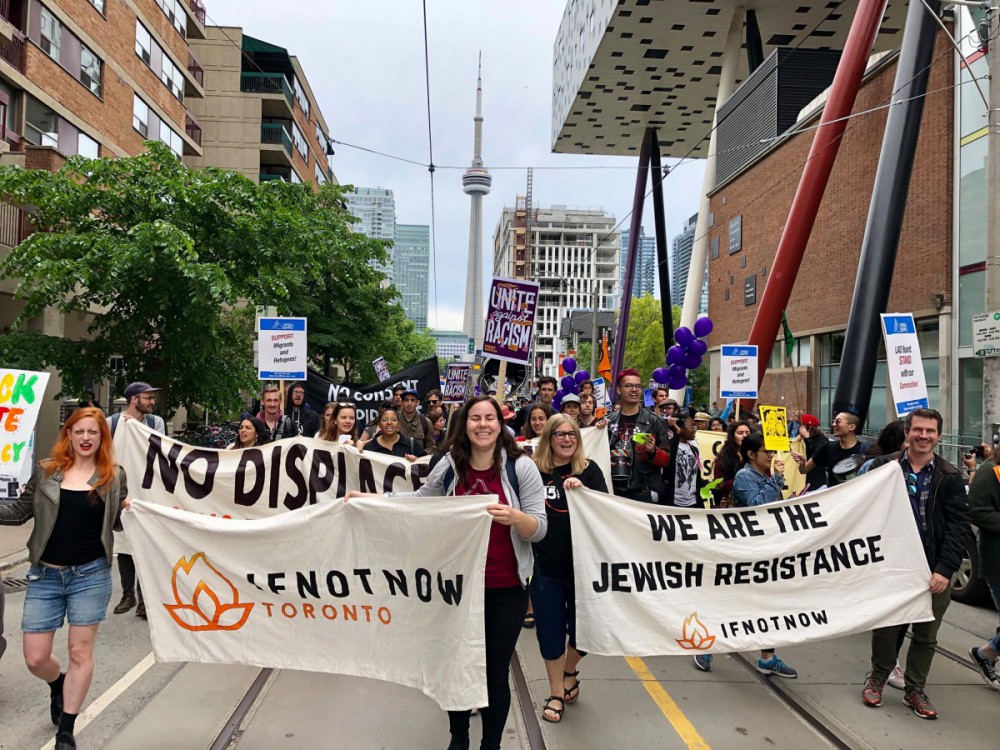
In the Middle Ages, many Jews were employed as moneylenders, an occupation that was both necessary for Christian economies and forbidden to Christians as sinful. This situation enabled a degree of Jewish material prosperity, while it also kept Jews extremely vulnerable to the Christian ruling classes’ arbitrary repression. Today’s white Jews who have been granted junior partnerships in empire and capital bear a certain resemblance to those Medieval ancestors. Not because they’re masterminds of financialized capitalism (call in your comrades who are talking this way – they’re normalizing antisemitic slurs), but because such Jews are precarious, their influence lent to them opportunistically by the white Christians who hold the vast majority of economic and cultural power. Leon Trotsky, a Jew, believed there would be no lasting safety for the Jewish people without the abolition of the capitalist system, given the particular compromised place Jews occupy in that system, subject to cycles of incorporation followed by scapegoating, murderous exclusion.
We also need to recognize that not all Jewish people today will be persuaded by arguments about Trotsky. Popular political education in our community is not where many of us would like it to be. That’s why I support IfNotNow’s big-tent strategy, whereby the organization takes no official line on issues like the Boycott, Divestment, and Sanctions movement (BDS) or Zionism as such, though individual members have opinions on these matters (I sure do!). This is an acknowledgement that conservative Jewish institutions have done an extremely effective job of stigmatizing BDS in particular, and that slow, careful work is needed to win over Jews who are afraid anti-Zionism is masking antisemitism (sometimes it is!), who fear that if they repudiate Israel they’ll have no refuge when Christian society bares its teeth at them again.
I feel that these Jews in my community should not be smeared or written off, but struggled with as well-intentioned people who are letting a project of national self-determination and safety take undue precedence over a properly internationalist and anti-imperialist one.
Theodor Herzl, the father of modern Zionism, was spurred to those politics by reporting on the antisemitic moral panic known as the Dreyfus Affair in France at the end of the 19th century, where trumped-up charges of treason against an elite French Jew revealed the antisemitic rot in French society. Zionism emerged specifically as a reaction to this profound, well-evidenced fear that Jews would never be safe without the protection of a national state project. There are some Jews today who reject the occupation but believe some sort of nationalist project is crucial to Jewish safety, who are therefore Zionists who reject most of the actually existing state of Israel, which they feel is a right-wing distortion of Zionism. Personally I’m not persuaded by this – I mistrust all ethnic nationalisms – but as a socialist I feel that these Jews in my community should not be smeared or written off, but struggled with as well-intentioned people who are letting a project of national self-determination and safety take undue precedence over a properly internationalist and anti-imperialist one.
We can’t gloss over such divisions in the Jewish community or the trauma-driven fears they index. We need to make the reality of the occupation real to our community members, combat misinformation, support them to heal their ongoing intergenerational trauma, and guide them – as we continue to guide ourselves – into a different ethical relationship to Judaism, Jewish community, and the struggles of others. That’s the work IfNotNow is doing, and the work I want to do personally.
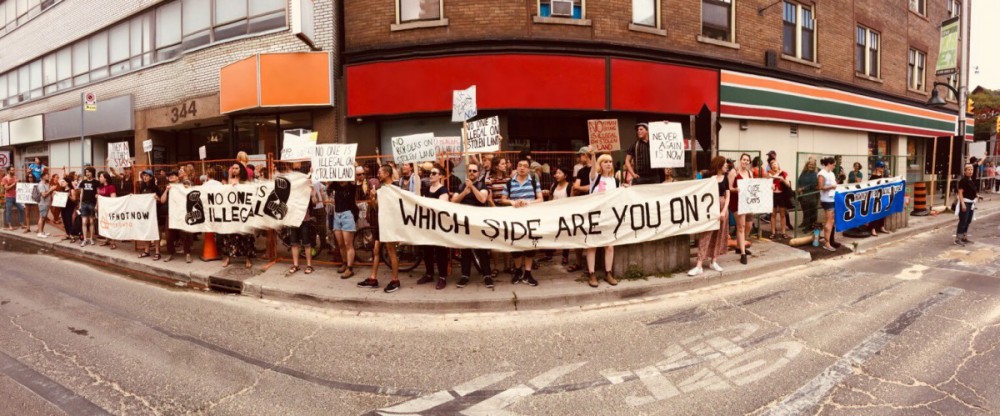
The #CloseTheCamps action two weeks ago, a protest for migrant justice that occupied the intersection at Bloor and Spadina in Toronto and marched to Minister of Foreign Affairs Chrystia Freeland’s office, is what I believe our struggles together should look like. IfNotNow, Showing Up For Racial Justice, No One Is Illegal, No More Silence, Climate Justice Toronto, Syria Solidarity Collective, and other groups rallied to condemn the regimes of cruelty to undocumented people across Turtle Island. We deepened our relationships of trust and learned better how to work together across complex coalitions. We used the specificity of our own struggles, our own historic and ongoing oppression, to ground the ethical urgency of our collective demands. We took the streets and spoke in one voice without erasing the complexity of its many constituent voices. We showed up for each other.
I believe that’s the way forward, for Jews and for all those who stand to lose in a fascist future, which is most of us. Safety in solidarity. Pleasure and understanding in solidarity, too.


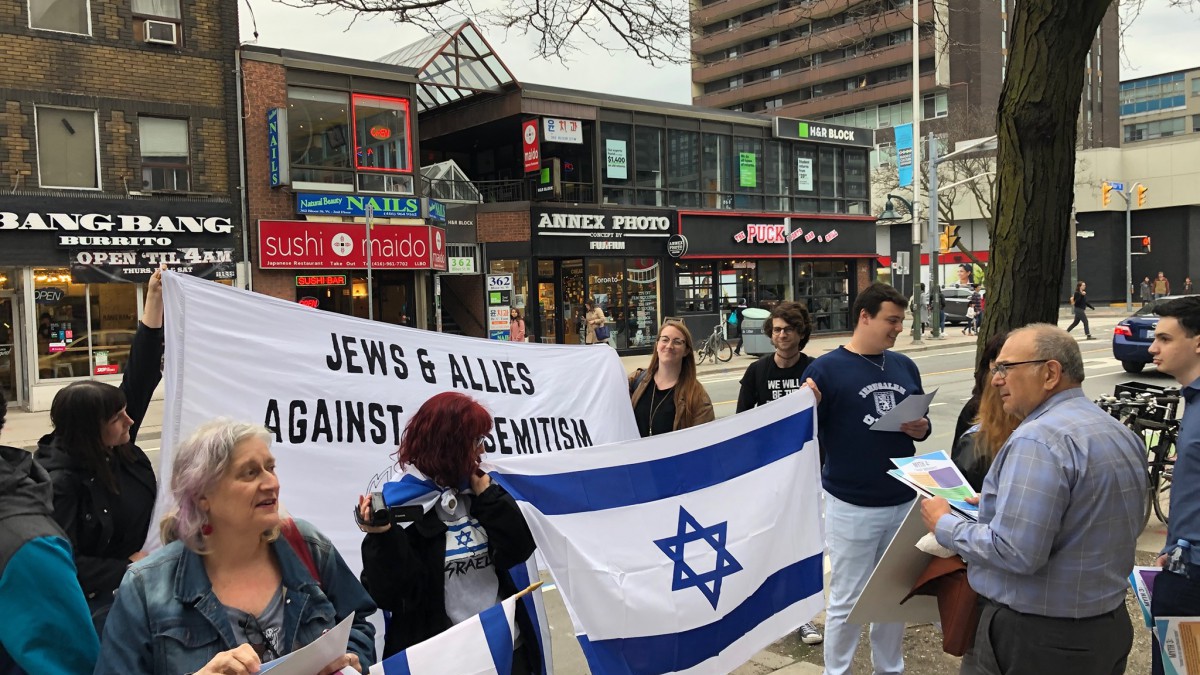
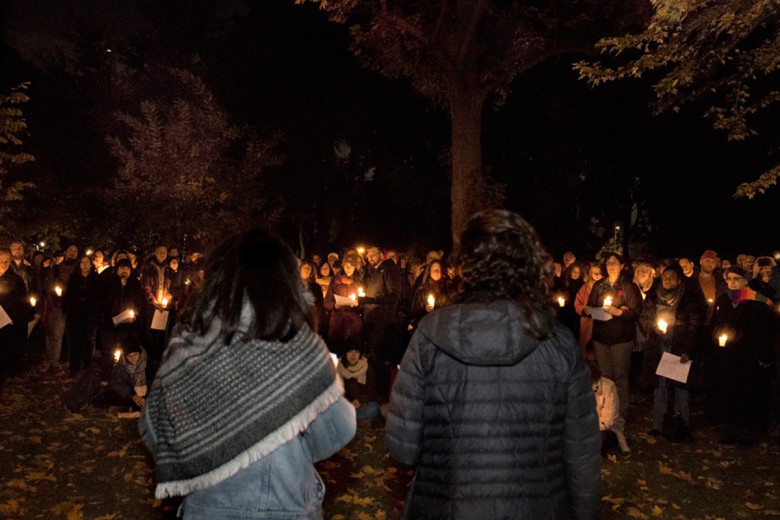
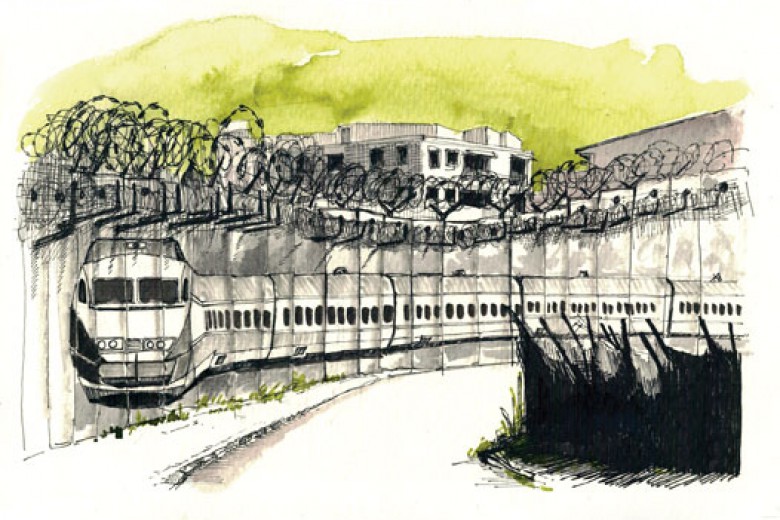
_copy_780_520_s_c1.png)
